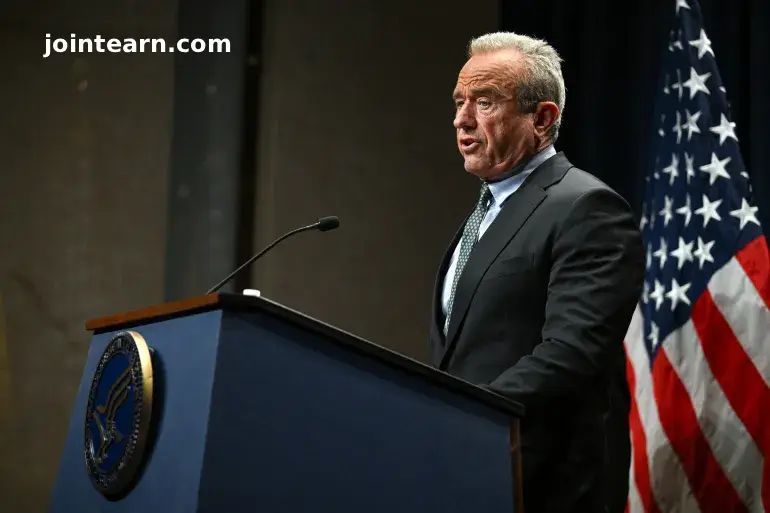
Health Secretary says evidence remains “suggestive but not definitive” as experts reaffirm no proven link between acetaminophen and autism.
WASHINGTON, D.C., October 29, 2025 — United States Health and Human Services Secretary Robert F. Kennedy Jr. has partially retracted his earlier statements suggesting a direct link between Tylenol (acetaminophen) use during pregnancy and autism in children. Speaking at a press conference alongside FDA Commissioner Marty Makary and CMS Administrator Mehmet Oz, Kennedy adopted a notably more moderate stance, urging Americans to follow medical guidance rather than political rhetoric.
“The causative association between Tylenol given in pregnancy and autism is not sufficient to say it definitely causes autism,” Kennedy said. “But it’s very suggestive. There should be a cautious approach — our message is simple: consult your physician.”
His remarks appeared to distance himself from President Donald Trump’s recent comments, in which Trump falsely claimed that acetaminophen “can be associated with a very increased risk of autism.” The President’s statement, widely condemned by medical experts, triggered confusion among expectant mothers and prompted new debates about drug safety and misinformation in public health policy.
Scientific Evidence Does Not Support the Claim
Leading health authorities, including the World Health Organization (WHO) and the Centers for Disease Control and Prevention (CDC), maintain that no consistent scientific evidence links Tylenol to autism or other neurodevelopmental conditions. While some studies have explored possible correlations, experts say these findings are inconclusive and not causative.
The WHO reaffirmed in September that “no consistent association has been established between acetaminophen use and autism despite extensive research,” warning against public panic and misinformation.
Kennedy’s updated tone on Wednesday brought his message closer in line with established health guidance — a significant shift from earlier comments in which he called Tylenol use during pregnancy “irresponsible.”
Misinformation and Legal Fallout
Despite scientific reassurances, Trump’s remarks have had tangible policy consequences. On Tuesday, Texas Attorney General Ken Paxton filed a lawsuit against Johnson & Johnson and its spinoff Kenvue, accusing them of “deceptively marketing Tylenol as the only safe painkiller for pregnant women.” Paxton’s complaint cited Trump’s and Kennedy’s rhetoric as justification for the suit, claiming it was part of an effort to “Make America Healthy Again” — a reference to Kennedy’s health initiative slogan.
Health policy experts warn that politicizing unverified medical claims could erode public trust. “When misinformation comes from leadership, it creates confusion and fear, particularly for expectant mothers,” said Dr. Lisa Perrin, an epidemiologist at Johns Hopkins University.
Kenvue, defending its product, stated:
“We stand firmly with the global medical community that acknowledges the safety of acetaminophen. These claims lack both legal merit and scientific support.”
The company emphasized that untreated fever or pain during pregnancy can pose greater risks to maternal and fetal health than Tylenol itself.
Kennedy’s Record and Controversial Statements
RFK Jr., a longtime critic of certain pharmaceutical practices, has repeatedly drawn scrutiny for spreading health misinformation, particularly on vaccines and drug safety. Earlier in October, he also mischaracterized research on male circumcision, falsely suggesting a correlation between early circumcision, Tylenol use, and autism — claims refuted by pediatric and neurological associations.
This latest walk-back appears to be part of a broader attempt by Kennedy to reassert scientific credibility within an administration frequently accused of undermining health institutions.
Public Health Officials Urge Evidence-Based Guidance
The American College of Obstetricians and Gynecologists (ACOG) reiterated that Tylenol remains one of the safest pain relievers for pregnant women when used as directed. Dr. Monica Harper, a senior ACOG spokesperson, stressed that “expectant mothers should never alter medication use based on political statements.”
The incident underscores growing concern over how public figures influence medical decision-making. With lawsuits emerging and misinformation spreading rapidly online, health experts are calling for renewed efforts to promote science-based communication from federal officials.
Key Takeaways
- RFK Jr. walks back claims linking Tylenol use in pregnancy to autism, saying evidence is “suggestive but not definitive.”
- Trump administration officials previously amplified the unproven autism link, prompting confusion and lawsuits.
- WHO and ACOG reaffirm there is no proven link between acetaminophen and autism.
- Health authorities urge the public to consult physicians and rely on evidence-based medicine.


Leave a Reply